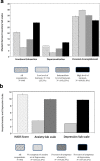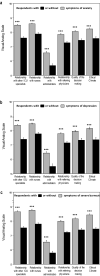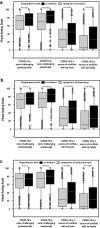Symptoms of burnout in intensive care unit specialists facing the COVID-19 outbreak
- PMID: 32770449
- PMCID: PMC7414284
- DOI: 10.1186/s13613-020-00722-3
Symptoms of burnout in intensive care unit specialists facing the COVID-19 outbreak
Abstract
Background: The COVID-19 pandemic has resulted in an unprecedented healthcare crisis with a high prevalence of psychological distress in healthcare providers. We sought to document the prevalence of burnout syndrome amongst intensivists facing the COVID-19 outbreak.
Methods: Cross-sectional survey among intensivists part of the European Society of Intensive Care Medicine. Symptoms of severe burnout, anxiety and depression were collected. Factors independently associated with severe burnout were assessed using Cox model.
Results: Response rate was 20% (1001 completed questionnaires were returned, 45 years [39-53], 34% women, from 85 countries, 12 regions, 50% university-affiliated hospitals). The prevalence of symptoms of anxiety and depression or severe burnout was 46.5%, 30.2%, and 51%, respectively, and varied significantly across regions. Rating of the relationship between intensivists and other ICU stakeholders differed significantly according to the presence of anxiety, depression, or burnout. Similar figures were reported for their rating of the ethical climate or the quality of the decision-making. Factors independently associated with anxiety were female gender (HR 1.85 [1.33-2.55]), working in a university-affiliated hospital (HR 0.58 [0.42-0.80]), living in a city of > 1 million inhabitants (HR 1.40 [1.01-1.94]), and clinician's rating of the ethical climate (HR 0.83 [0.77-0.90]). Independent determinants of depression included female gender (HR 1.63 [1.15-2.31]) and clinician's rating of the ethical climate (HR 0.84 [0.78-0.92]). Factors independently associated with symptoms of severe burnout included age (HR 0.98/year [0.97-0.99]) and clinician's rating of the ethical climate (HR 0.76 [0.69-0.82]).
Conclusions: The COVID-19 pandemic has had an overwhelming psychological impact on intensivists. Follow-up, and management are warranted to assess long-term psychological outcomes and alleviate the psychological burden of the pandemic on frontline personnel.
Keywords: Acute respiratory distress syndrome; Coronavirus; Depersonalization; Exhaustion; Pneumonia; Well-being.
Conflict of interest statement
Authors declare no conflict of interest in relation with this survey.
Figures





References
LinkOut - more resources
Full Text Sources
Medical

